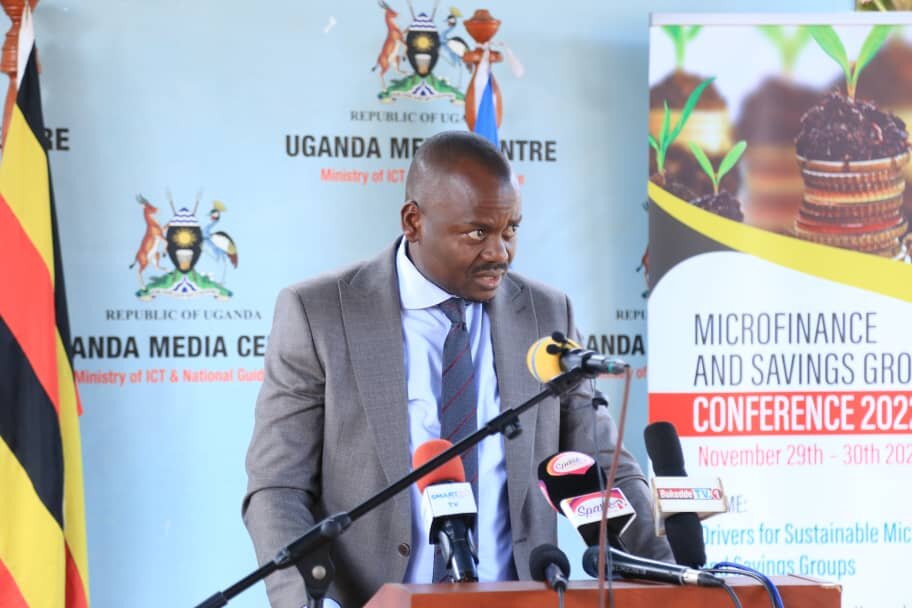KAMPALA-A two-day hybrid Annual Microfinance and Savings Groups Conference 2022 kicked off on Tuesday at Hotel Africana in Kampala, attracting different players from the private sector, government, academia, civil society, and academia.
The conference is an opportunity to share the findings of the National Savings Groups Policy Framework Study and also promote the adoption of digital technologies in microfinance.
The conference is set to discuss critical matters and build consensus on the future of the microfinance and savings groups in Uganda under the theme, “Drivers for Sustainable Microfinance and Savings Groups in Uganda”.
Dr. Isaac Nkoote, the Chairperson organising committee of conference while giving his opening remarks noted that better interventions and strategies need to be set for the microfinance sector in the country to grow.
“This conference will be held annually and we shall be calling upon each one of you to help us organise it so that we can move on the same wavelength for the growth of the microfinance sector,” he said.
The objectives of the conference is to institutionalise the social and economic empowerment of vulnerable communities through applying environment, social and governance [ESG] principles to microfinance and savings groups.
The conference offers an opportunity to share experiences on how ESG and digitisation can help the micro-finance sector steer through the turbulent times using case studies, experience sharing, trend analysis and discussion on emerging sound practices.”
Shafi Nambobi, the Association of Microfinance Institutions of Uganda [AMFIU] Board President while addressing guests at the conference said they have so far held five national microfinance conferences.
He said they are Promoting the adoption of digital technologies in the microfinance sector and savings groups through sharing of practical experiences and case studies.
He stressed the importance of inclusive financial services in the country. “The provision of inclusive financial services is critical in enabling various segments of the population achieve their dreams,” he said.
He said AMFIU in collaboration with other stakeholders continues to provide support to its members with the ultimate goal of enabling active Ugandans to access stable and sustainable financial services.
Nambobi who is also the CEO of UGAFODE Microfinance said AMFIU’s membership has reached over 2.7 savers, 1, 08 million borrowers with a loan portfolio of over Shs1.9 trillion.
The AMFIU President lauded government for ensuring an enabling environment for the sector to operate, such as the amendment of the Microfinance Deposit-taking Institutions [MDI Act ]2022 and the establishment of the Uganda Microfinance Regulatory Authority [UMRA] to license and supervise Tier4 Microfinance institutions.
However, Nambobi said Tier4 financial institutions do not enjoy the same tax-deductible items like loan losses for those institutions regulated.
” The microfinance sector in Uganda has continued to grow through the application of deep-rooted sound practices that stress a double bottomed line that emphasizes the economical and social transformation of their customers,” said Nambobi.
The Principal of Makerere University Business School [MUBS], Prof. Juma Waswa Balunywa while giving his remarks noted that there is need for continued growth of the microfinance sector in Uganda, saying it serves the biggest size of the population in the country.
“There is need for continued growth of the micro-finance sector in Uganda because its the biggest sector that serves the biggest size of the population,” he said.
The Minister of State Microfinance and Small Enterprises Haruna Kasolo Kyeyune said stakeholders including those from outside of Uganda would during the two days of the conference discuss critical matters and build consensus on the future of the Microfinance and savings groups in Uganda” Kasolo.
He said government was reviewing laws to grow the sector. “The process of reviving the relevant laws has commenced. All you stakeholders are welcome to have your say to ensure that we evolve a credible and dependable microfinance industry in the country,” he said.
He said the Microfinance industry in Uganda is one of the most critical government interventions in the quest for financial inclusion with many local and adopted initiatives such as Emyooga programme and the Parish Development Model [PDM].
He said his ministry has developed a comprehensive business development service strategy to ensure that the micro SMEs are well acquainted with the necessary competencies in financial literacy, accounting, management and leadership.”
He lauded UMRA for promoting microfinance best practices in the country, saying government would strengthen capacities of regulatory agencies.
“The focus to take the industry forward include Strengthening the regulatory framework; my ministry and government at large will work tirelessly to ensure that we strengthen the capacity of the institutions responsible for regulation of the sector.”
“The goal of the Parish Development Models is to increase household incomes and to improve the quality of life of Ugandans with special focus on the total transformation to the money economy, of the 39% households still stuck in subsistence”
The Finance ministry’s permanent secretary and secretary to the treasury, Ramathan Ggoobi said Ugandan savings groups [VSLAs] are significant contributors to financial inclusion in Uganda, especially for the rural population. The Permanent Secretary, Ministry of Finance
“Research continues to show that VSLAs are significant contributors to financial inclusion in Uganda, especially for the rural population,” he said, adding that Rural persons predominantly use VSLAs for saving [43.9 percent] and credit [47.7 percent]. This was attributed to the speed of approval in these groups.
Dr G R Chintala The Former Chairman, National Bank for Agriculture and Rural Development [NABARD] in India said savings are not an end but a lever for bank loan. Indian microfinance model based on self-help groups [SHGs] uses public deposits for poverty alleviation.
NABARD studies have revealed that even the poorest of people can save and those savings are used for internal lending and mobilise funds for contigencies, leveraging bank loans for consumptions and economic activities,” Chintala said.
https://thecooperator.news/microfinance-support-centre-msc-to-establish-an-office-in-masindi/
Buy your copy of thecooperator magazine from one of our country-wide vending points or an e-copy on emag.thecooperator.news
